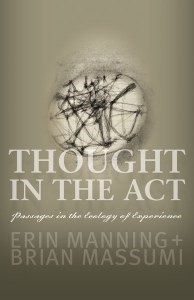
Books
THE Minor Gesture
Duke University Press (2016)
The minor gesture, although it may pass almost unperceived, transforms the field of relations. More than a chance variation, less than a volition, it requires rethinking common assumptions about human agency and political action. To embrace the minor gesture's power to fashion relations, its capacity to open new modes of experience and manners of expression, is to challenge the ways in which the neurotypical image of the human devalues alternative ways of being moved by and moving through the world in particular what Manning terms "autistic perception." Drawing on Deleuze and Guattari's schizoanalysis and Whitehead's speculative pragmatism, Manning's far-reaching analyses range from fashion to depression to the writings of autistics, in each case affirming the neurodiversity of the minor and the alternative politics it gestures toward."
THOUGht in the act: passages in the ecology of Experience
by Erin Manning and Brian Massumi
University of Minnesota Press (April 2014)
Combining philosophy and aesthetics, Thought in the Act is a unique exploration of creative practice as a form of thinking. Challenging the common opposition between the conceptual and the aesthetic, Erin Manning and Brian Massumi “think through” a wide range of creative practices in the process of their making, revealing how thinking and artfulness are intimately, creatively, and inseparably intertwined.
Always More Than One: Individuation's Dance
Duke University Press (Jan 9 2013)
Introduction by Brian Massumi
In Always More Than One, the philosopher, visual artist, and dancer Erin Manning explores the concept of the "more-than human" in the context of movement, perception, and experience. Working from Whitehead's process philosophy and Simondon's theory of individuation, she extends the concepts of movement and relation developed in her earlier work toward the notion of "choreographic thinking." Here, she uses those concepts to explore a mode of perception prior to the settling of experience into established categories. Manning connects this to the concept of "autistic perception," described by autistics as the awareness of a relational field prior to the so-called "neurotypical" tendency to "chunk" experience into predetermined subjects and objects. Autistics explain that, rather than immediately distinguishing objects - such as chairs and tables and humans - from one another on entering a given environment, they experience the environment as gradually taking form. Manning maintains that this mode of awareness underlies all perception. What we perceive is never first a subject or an object, but an ecology. From this vantage point, she proposes that we consider an ecological politics where movement and relation take precedence over predefined categories, such as the neurotypical and the neurodiverse, or the human and the nonhuman. What would it mean to embrace an ecological politics of collective individuation?
Relationscapes: Movement, Art, Philosophy
The MIT Press (Feb 27 2009)
With Relationscapes, Erin Manning offers a new philosophy of movement challenging the idea that movement is simple displacement in space, knowable only in terms of the actual. Exploring the relation between sensation and thought through the prisms of dance, cinema, art, and new media, Manning argues for the intensity of movement. From this idea of intensity--the incipiency at the heart of movement--Manning develops the concept of preacceleration, which makes palpable how movement creates relational intervals out of which displacements take form. Discussing her theory of incipient movement in terms of dance and relational movement, Manning describes choreographic practices that work to develop with a body in movement rather than simply stabilizing that body into patterns of displacement. She examines the movement-images of Leni Riefenstahl, Étienne-Jules Marey, and Norman McLaren (drawing on Bergson's idea of duration), and explores the dot-paintings of contemporary Australian Aboriginal artists. Turning to language, Manning proposes a theory of prearticulation claiming that language's affective force depends on a concept of thought in motion. Relationscapes takes a "Whiteheadian perspective," recognizing Whitehead's importance and his influence on process philosophers of the late twentieth century--Deleuze and Guattari in particular. It will be of special interest to scholars in new media, philosophy, dance studies, film theory, and art history.
Politics of Touch: Sense, Movement, Sovereignty
University Of Minnesota Press (Dec 11 2006)
Political philosophy has long been bound by traditional thinking about the body and the senses. Through an engagement with the state-centered vocabulary of this discipline, Politics of Touch explores the ways in which sensing bodies continually run up against existing political structures. In this groundbreaking work, Erin Manning reconsiders how new politics can arise that challenge the national body politic.
In Politics of Touch, Manning develops a new way to conceive the role of the senses, and of touch in particular. Exploring concepts of violence, gender, sexuality, security, democracy, and identity, she traces the ways in which touch informs and reforms the body. Specifically considering tango-a tactile, rhythmic, and improvisational dance- she foregrounds movement as the sensing body's intervention into the political. With a fresh vision and an original theoretical basis, Manning shows the ontogenetic potential of the body, and in doing so, redefines our understanding of the sense of touch in philosophical and political terms.
Erin Manning is assistant professor of fine arts at Concordia University and the author of Ephemeral Territories (Minnesota, 2003).




